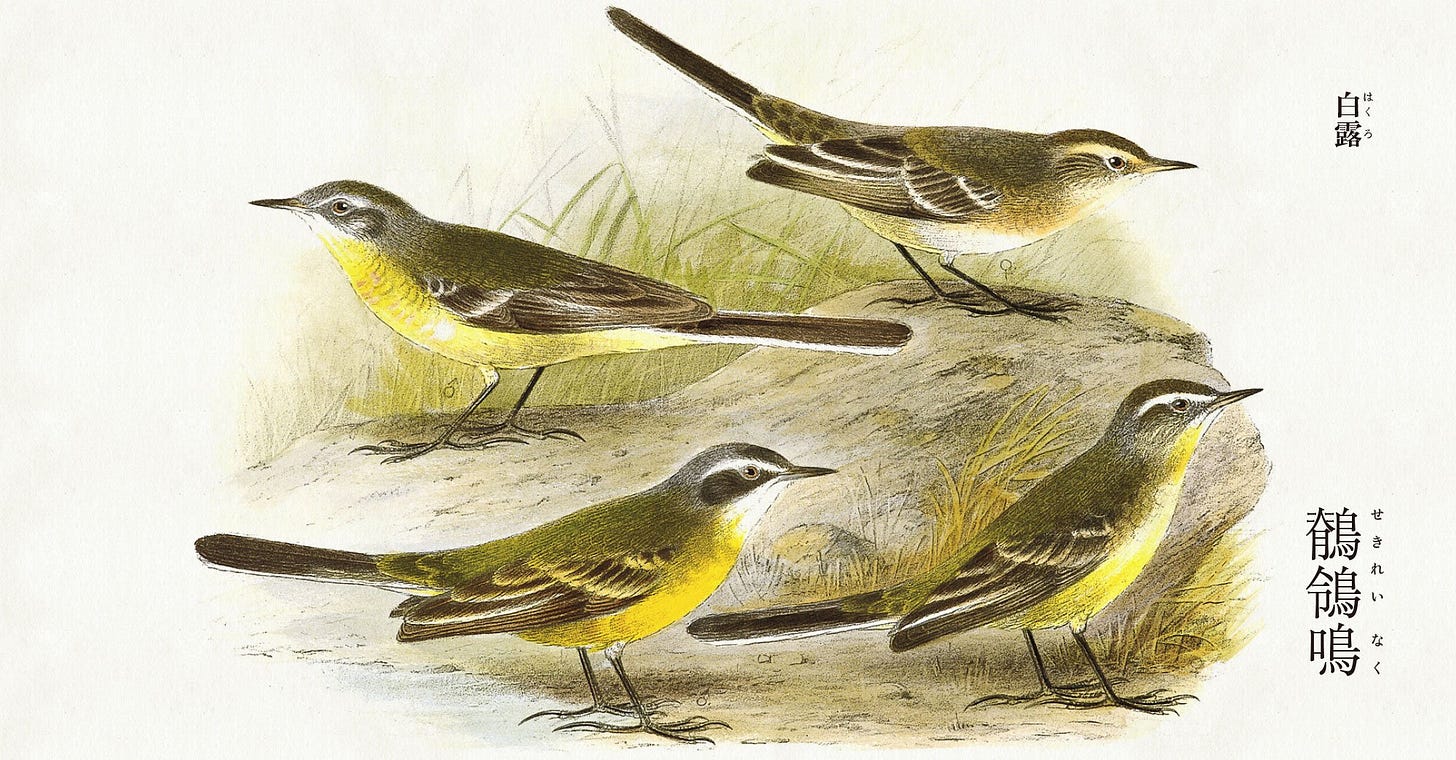Let's catch up shall we?






How have you all been these last few weeks? Hopefully less busy and more at rest than yours truly. It's been a bit of a sprint here, with lots of movement and very little time to stop and smell the roses (or notice the seasons, as the case may be). I'd like nothing more than to rectify that and catch us up properly—with all the rambling, wandering paragraphs I enjoy writing—but in truth, looking to the rest of the year for my household, that seems unlikely.
So, in the interest of getting us back on track and resuming our normal pace sometime before the clock strikes midnight on December 31st, I thought we'd try something a little different: for each of the six microseasons we've missed reflecting on together, I've written an original tanka poem1. I thought it'd be a bit more fun than a bunch of rushed newsletters scrambling on top of each other in your inboxes like crabs hauled in from the sea and dumped on deck. Plus, a little bit of self-imposed creative restraint can be good.
I do hope you enjoy them, and if we're still at this together next year I promise an extra helping of rambling musings for these six. A recap of the kō's names and dates can be found at the end (or always on Twitter) if you’re a purist2.
As ever, my humble and heartfelt thanks for your readership, support, and patience.
Without further ado, some microposts for the microseasons:
Kō 44 - Wagtails Sing Brightly
songs ringing like bells,
a pair flitting and flirting
in clear autumn skies—
it’s said they taught the first gods
how to love when the work’s done
Kō 45 - Swallows Fly Away
they arrived alone
and raised families in our homes—
now all together,
they fly hours and hours a day
bringing seasons to a close
Kō 46 - The Voice of Thunder Quiets
calmer and cooler,
no typhoon-calling thunder,
the heat and storms passed—
where did all that power go?
grains of rice filled with lightning
Kō 47 - Insects Hole Up Underground
things that crawl below
feel first the coming of cold
and search for safety—
bugs, plus snakes, frogs, and lizards
dream and wait for spring to come
Kō 48 - Rice Fields Are Drained
when rice bow their heads
flooded fields built by farmers
are emptied and dried—
water withdraws into earth,
supple green leaves wither brown
Kō 49 - Wild Geese Come To Winter
swapping with swallows
northern winds bring waterfowl
to close out the year—
flowers and trees lose luster,
but ponds reflect bright colors
And that brings us to a nice even 50 for our next kō, which just started today! I tried my best to fit some interesting tidbits into each five-line stanza, which I hope piqued your imagination and curiosity somewhat and provided a nice glimpse of what these kō are about.
As you may have noticed, a common theme for this block of microseasons is a completion of cycles begun earlier in the year: migratory birds come and go, harvests are finished, and the stormy gods Raijin and Fūjin cease their noisy quarreling for a bit. Yins and yangs, bookends bordering spring and autumn. These things will soon repeat, as they have for centuries before anyone wrote about them.
See you next kō~
[Images & info by kurashikata.com, kurashi-no-hotorisya.jp, 543life.com, and Wikipedia except where otherwise noted]
The preview image for this entry, if you’re curious, is of a higanbana (彼岸花), the red spider lily—it symbolizes the autumnal equinox and subsequent turning of the year, which felt appropriate to cover this period
Tanka differ slightly from haiku in that 1) they have two extra lines and fourteen extra syllables to work with, and 2) are a little less strict in content, not requiring a kigo or kireji to be included
Here they are:
Kō 44
September 13 - 17
鶺鴒鳴
せきれいなく
Sekirei naku
”Wagtails sing brightly”
Kō 45
September 18 - 22
玄鳥去
つばめ さる
Tsubame saru
”Swallows fly away”
Kō 46
September 23 - 27
雷乃収声
かみなり すなわち こえを おさむ
Kaminari sunawachi koe wo osamu
”The voice of thunder quiets”
Kō 47
September 28 - October 2
蟄虫培戸
むし かくれて とを ふさぐ
Mushi kakurete, to wo fusugu
”Insects hole up underground”
Kō 48
October 3 - 7
水始涸
みず はじめて かる
Mizu hajimete karu
”Rice fields are drained”
Kō 49
October 8 - 12
鴻鴈来
こうがん きたる
Kōgan kitaru
”Wild geese come to winter”










lovely, as always
I’m so glad you’re back! What a GREAT way to celebrate the beauty of these tiny seasons by writing a series of poems. Each one was special. Thank you, Iki!